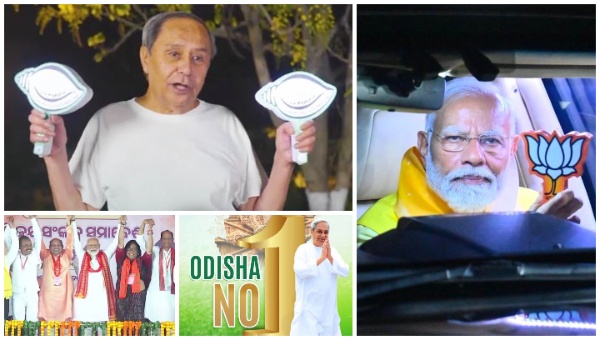Odisha Elections 2024: Of Asmita, Odia & Other Matters

Elections offer many reasons to sit back and reflect. Sometimes they need not be about politics at all. They can be about the atmospherics and inanities that accompany electioneering. Sometimes they can be about logical discrepancies in politicospeak as well. Here are a few we pick for you.

Asmita Vs Swabhiman: What’s More Alien?
‘Asmita’, a word in wide circulation in this election, is a relatively new entrant to the vocabulary of Odisha’s politics. The BJP has been attacking the BJD for compromising the pride of Odias by imposing someone of Tamil origin on people.
Interesting, considering Asmita is originally a Sanskrit word, and is as alien to the lay Odia as the English word ‘pride’. Its Odia equivalent would be ‘Swabhiman’. If Odianess is the salient matter, wouldn’t ‘Swabhiman’ be a better choice of word?
Asmita, according to ancient texts, could mean ego, vanity, self-respect or pride. While self-respect is the commonly accepted connotation, Patanjali’s Yoga Sutra counts it as one of the five kleshas (afflictions) of the mind, the others being Avidya (ignorance), Raga (attachment to and desire for material comforts), Dvesha (aversion to unpleasantness), and Abhinivesha (fear). But semantics can wait, it doesn’t matter. Particularly if it is exotic.
Swabhiman, whatever its origin, is more relatable. And it certainly carries more gravitas than Asmita.
Identity Politics: Language No Bar
Language is one of the important markers of identity. Any perceived threat to it can turn into an emotive issue for people. The same emotions had led to the formation of Indian states on linguistic basis post Independence. Political parties can reap rich electoral dividends if they play the language card smart.
In Odisha’s politics, things appear a bit twisted. The top leadership of the ruling party – the supreme leader and the second-in-command – don’t speak Odia fluently. That holds true for a few opposition leaders as well. This could lead to one conclusion: language is less important as an immediate concern for people compared to other everyday matters.
Hindi has penetrated deep in Odisha. Thanks to television, and special thanks to the Kapil Sharma Show and KBC, kids and young adults in villages are more than familiar with the language and they use it often in routine conversation. English has been normalised in the circles of the educated and upwardly mobile. But the popular acceptance has not necessarily come at the cost of Odia. It thrives.
The acceptance appears to have extended to politics too. There is no apparent revulsion for outsiders. If it has a subterranean existence, it would be visible in the election results.
Coming back to language, it seems the language of politics overrides all others.
Modi’s Guarantee Vs Double Sankha: The Digital Assault
If you have a smartphone and access to the internet there’s no escaping political advertisements. From Prime Minister Narendra Modi’s guarantee to Odisha Chief Minister Naveen Patnaik’s Jodi Sankha – BJD’s counter to BJP’s double-engine sarkar – the persistent digital assault on your senses is unstoppable.
In India, which has 751 million people with access to the internet and 650 million possessing smartphones, it’s no wonder that digital advertising has taken precedence over other forms of advertising. It facilitates micro-targetting voters. It means parties can reach out to the fence-sitters, otherwise known as the swing voters, directly and win them over to their side. And it works out cheaper compared to print and television ads. The BJP used it to telling effect in 2014 general elections. Now, others have joined the bandwagon.
In rural Odisha, which had connectivity issues earlier, things have improved dramatically. According to the Annual Survey for Education Report, smartphone density had gone up to 64.1 percent in rural Odisha in 2022 from around 20 percent in 2018. In urban areas it is above 86 percent. It’s not surprising that parties are going all-out for digital.
Does the reach and power of persuasion of digital media really work? Nobody knows. Just as nobody knows whether the massive crowd at rallies means votes for a party. Voters are cynical and smart too. They know the games politicians play. They keep cards close to their chests.
(By Arrangement With Perspective Bytes)

Comments are closed.